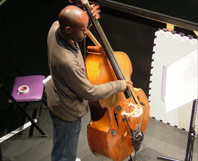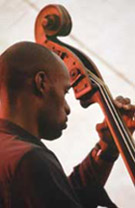CONCERT JAZZ
Events -
Chiltern Hundreds Area
|
CONCERT JAZZ
Events - |
|
|
Larry Bartley on the Double Bass (Larry appeared at Concert Jazz Gig 18 with Jo Caleb on 13/12/06)
The double bass is the largest and
lowest-sounding instrument of the string family. It doesnt have a huge
amount of solo repertory but it plays a very important role in both jazz
bands and classical orchestras.
How is it played?
The double bass is so large that players have to
stand up or sit on a high stool to play it. Like all stringed instruments in
an orchestra, the bass can be played with a bow or plucked with the fingers.
Larry Bartley introduces some of the techniques
that bass players use in jazz
Sometimes the determination to play an instrument can become almost an obsession. Larry Bartley explains how the double bass turned his life around
WHEN IT COMES to choosing what musical instrument to take up, the double bass doesn't come high on most people's lists. Plenty of school music departments don't even own a double bass or if they do it's quite likely to be in poor shape. School musicians rarely play them because they're expensive to buy, hard to hire, awkward for small fingers to play, and in the bigger sizes need a willing parent with a big car to do the ferrying around. On top of all that, it's hard to be a star on the double bass, which is often hard to hear in a loud band or orchestra. But there are a lot more bass stars in jazz which encourages bass improvisation than in classical music, where there are few solo roles given to the bass. But when you get to listen to it properly, the bass makes a wonderful, rich sound, adds a vital depth to music, and has a character all of its own. Thankfully, plenty of young musicians still get bitten by the bug to play an instrument that has no wires or buttons, and looks like a piece of antique furniture. Most young bassists didn't play the bass to start with classical players often started on the cello first, and most other kinds of musicians started on electric bass guitar.
LARRY BARTLEY was an experienced electric
bassist in his mid-20s when a change in his life started to happen. He
was about to do something that didn't seem to make much sense if he was
trying to make a go of life as a musician. But the double
bass became more and more of an obsession. He loved the look of it, and
he loved the noise it made. But whereas a decent electric bass will cost
a few hundred pounds, a good acoustic bass can set you back a few
thousand. The day of reckoning finally came for Larry Bartley. He
decided to ditch all his regular electric bass gigs, took up all the odd
jobs he could find, got some help from a supportive girlfriend, and
started saving up for his first double bass.
I stayed home from February to December. I just practised every single day... I thought, Im going to learn to play this thing WHEN YOU PLAY a guitar, at least the instrument is showing you where the notes are - the frets mark out the divisions between tones. On any of the violin family and the double bass is just a big violin stood on end you don't get that kind of help, and you have to get used to where the notes are by touch and practice.
That means the fingering has to be as
precise as if you had invisible frets on the instrument. As with
violinists, viola-players and cellists, the basic position in which
you shape your hand from which to start fingering the notes is very
important. If your fingers are flat, it's harder to plant the
finger-ends squarely on precisely the right position to get the
correct intonation and the flatter they are, the more likely your
fingers are to touch the wrong string on their way across to the
right one.
When do you stop practising and start playing 'for real'? For Larry Bartley it was a momentous bridge to cross  LARRY
BARTLEY felt so confident once he owned his first double bass, he
would tell everyone he met that he was going to be the world's
greatest bass-player. At the time, he could hardly hold the
instrument, and had little idea how it was played. But his obsession
with the instrument spurred him on. LARRY
BARTLEY felt so confident once he owned his first double bass, he
would tell everyone he met that he was going to be the world's
greatest bass-player. At the time, he could hardly hold the
instrument, and had little idea how it was played. But his obsession
with the instrument spurred him on.
He practised constantly. And he got
good at it. Hardly anybody except his girlfriend heard him
play because he hardly ever took the bass out of his house. But
somehow the word got around. One day Larry got a call from
someone telling him that Gary Crosby a fine British bassist
who had worked with Courtney Pine and all-black British big band
the Jazz Warriors couldn't make a recording session. Could
Larry do it?
Larry recalls: 'I said, "I've only been playing the double bass for eight months," and they were like, "No come down, youll be great."' And so he went, having no idea who was going to be on the session until he arrived at the studio and saw Clifford Jarvis, a famous American jazz drummer who had moved to London. I was terrible. A lot of it was
nerves... I just couldnt play anything How do you become an experienced live performer? You get on the stage and play...
THE CALLS started to come in for Larry
Bartley. He was finding, as many inexperienced jazz musicians do,
that you can learn some things a lot faster in the heat of the
moment trying to keep up with skilled jazz improvisers on a gig or
a recording than you can from hours spent studying a book. Drummer
Clifford Jarvis introduced Larry to one of his first live-gig
situations. Jarvis was playing with trumpeter Roy Burrowes, an
American who had worked with the legendary Duke Ellington.
Larry got his first lessons in handling
the trickier personal aspects of being a professional. Jarvis and
Burrowes had known each other for years and were very close but
they argued like an old married couple, and on the day of Larry's
first gig with them they were barely speaking to each other. Or, for
that matter, to the other musicians either.
I remember sitting backstage and saying, "Wow, is this it? Is this what it is to play with Clifford Jarvis, guys of that calibre?"
All musicians need inspiration. For
Larry Bartley, it came in the form of fellow bass-player Gary Crosby It's bulky and cumbersome, yet it's highly fragile and expensive. Larry Bartley explains why the pleasures of playing the acoustic bass far outweigh the difficulties IF YOU ASK Larry Bartley why he got interested in the double bass, he has to scratch his head and cast his mind back a long way. He recalls seeing old Elvis Presley movies on the TV as a kid, and those rock 'n' roll bands of Elvis's early years before the Fender bass guitar had ever become popular used acoustic bass-players. Something about the instrument got to him. When anybody mentioned the word 'bass', an old wooden upright was what he saw in his mind, not an electric bass guitar. But an electric bass was affordable, and an acoustic bass wasn't. There are double basses that cost more than houses... its antique furniture, so they make you pay for it When he finally got around to realising his dream, Larry also discovered that a whole new life went with it. It was a bit like taking care of a giant baby. For a start, acoustic bassists get used to taking more care than anyone playing an electric guitar or even a violin or a cello in a tough, reinforced case. If something heavy hits the bridge the raised section the strings stretch over, close to where the bassist plucks them the impact can split the wooden body, or even drive the soundpost into the instrument and out through the back of the box. But Larry Bartley has got used to these anxieties now.  The
secret of effective double bass-playing is all in the fingers. The
secret of effective double bass-playing is all in the fingers.
WHEN YOU HEAR a good jazz bass player
and then one who isn't so good, part of the difference can be to do
with projection and precision. The good one may make a bigger sound,
but it isn't just about volume it's as if each note is sharpened
to a point, so it seems to have more of a cutting edge, and its
pitch is clear and true. This is essential to give the bass a strong
rhythmic role, but also in order that its lower notes don't lose
definition and sound muddy and blurred a big problem with plucked,
or pizzicato, playing on the instrument. Larry Bartley uses a
fingering technique that adds a rhythmic emphasis to the way he
sounds a note. It's particularly useful in situations where he's
playing in a duet with a soloist, without the help of a drummer's
rhythmic punch. Bassist panic - A kid starts turning the machine head keys on an abandoned Bass on stage out of curiosity - he is suddenly seized by the collar by the angry bassist - "Don't hit me Mr - he implores" Bassist - "I wont hurt you kid - as
long as you tell me which keys you turned in which direction and how
far" |
Send mail to
jazzmaster@jazzeddie.f2s.com
with questions or comments about the design only of this web site.
|